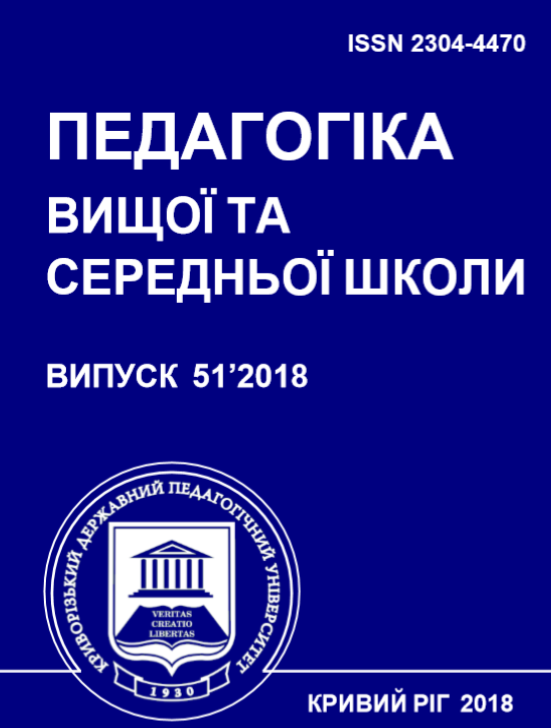Stages of Conceptualization and Formalization in the Design of the Model of the Neuro-Fuzzy Expert System of Professional Selection of Pupils
DOI:
https://doi.org/10.31812/pedag.v51i0.3664Keywords:
professional orientation, professional selection, expert system, design, neuro-fuzzy modeling, conceptualization, formalization, structural modelAbstract
Buyak B.B., Tsidilo I.M., Repskiy V.Í. and Lyalyuk V.P. Stages of Conceptualization and Formalization in the Design of the Model of the Neuro-Fuzzy Expert System of Professional Selection of Pupils.
The article describes the problem of designing a neuro-fuzzy expert system of professional selection at the stages of conceptualization and formalization, which involves the definition of concepts, relationships and management mechanisms necessary to describe the solution of problems in the chosen subject field. The structural model of the decision making system for determining the professional selection of students for training in IT specialties is substantiated. Three subsystems are proposed as structural components for studying: psychological peculiarities, personal qualities, factual knowledge, abilities and skills of students. The quality of the system’s operation is determined by the use of various techniques for acquiring knowledge on the basis of which the knowledge base of the neuro-fuzzy system and the combination of the use of fuzzy and stochastic data will be formed.
Downloads
References
Aidinian, A. R., Tcvetkova, O. L.: Metodika otcenki kachestva obucheniia studentov vuza s ispolzovaniem neiro-nechetkogo podkhoda (Methods of estimation of the quality of students’ education with the use of neuro-fuzzy approach). Programmnye produkty i sistemy. 29 (4), 189–193 (2016). DOI: https://doi.org/10.15827/0236-235X.116.189-193
Bekh, I. D.: Stanovlennia profesionala v suchasnykh sotsialnykh umovakh (Becoming a professional in modern social conditions). Pedahohika tolerantnosti. 3–4, 157–162 (2001).
Beliakov, A. G., Mandel, A. S.: Analiz dostovernosti vyvodov, formiruemykh s pomoshchiu ekspertno-statisticheskikh sistem (The analysis of reliability of the conclusions formed with the help of expert statistical systems). Ros. AN. In-t probl. upr. im. V. A. Trapeznikova, Moscow (2002).
Berezsky, O., Melnyk, G., Batko, Yu.: Modern Trends in Biomedical Image Analysis System Design. In: Laskovski, A. (ed.) Biomedical Engineering, Trends in Electronics, Communications and Software, pp. 461–480. InTech, Rijeka (2011). DOI: https://doi.org/10.5772/13575
Dubovoi, V. M., Kovaliuk, O. O.: Modeli pryiniattia rishen v upravlinni rozpodilenymy dynamichnymy systemamy (Models of decision-making in the management of distributed dynamic systems). UNIVERSUM-
Vinnytsia, Vinnytsia (2008).
Granin, S. S., Mandel, A. S.: Stationary Inventory Control Policies in Supply Systems under Inflation Condition. Automation and Remote Control. 77 (8), 1453–1460 (2016). DOI: https://doi.org/10.1134/S0005117916080117
Hlon, O. V., Dubovoi, V. M.: Modeliuvannia system keruvannia v umovakh nevyznachenosti (Modeling of control systems under uncertainty). UNIVERSUM-Vinnytsia, Vinnytsia (2004).
Iliasov, B. G., Startceva, E. B., Iangurazova, N. R.: Modulnaia struktura bazy znanii ekspertnoi sistemy “Vybor spetcialnosti pri postuplenii v vuz” (Modular structure of the knowledge base of the expert system “The choice of specialty at admission to an institution of higher education”). Neftegazovoe delo. 2. http://ogbus.ru/authors/Ilyasov/Ilyasov_1.pdf (2006). Accessed 29 Jan 2017.
Kirpichnikov, A. P., Liasheva, S. A., Shleimovich, M. P., Leonova, I. V.: Proektirovanie avtomatizirovannoi sistemy obrabotki dannykh uspevaemosti studentov na osnove nechetkoi logiki (Designing an automated system for data processing of students’ progress based on fuzzy logic). Vestnik Kazanskogo tekhnologicheskogo universiteta. 372–376 (2014).
Kruglov, V. V., Dli, M. I., Golunov, R. Iu.: Nechetkaia logika i iskusstvennye neironnye seti (Fuzzy logic and artificial neural networks). Izdatelstvo fiziko-matematicheskoi literatury, Moscow (2001).
Krushelnytska, Ya. V.: Fiziolohiia i psykholohiia pratsi (Physiology and psychology of labor). KNEU, Kyiv (2003).
Lozovetska, V. T.: Profesiine stanovlennia osobystosti v suchasnykh umovakh pratsi (Psychological and pedagogical aspects of professional formation of personality in modern working condition). Naukovyi visnyk Instytutu profesiino-tekhnichnoi osvity. 5, 20–24 (2013).
Luger, G. F.: Artificial Intelligence: Structures and Strategies for Complex Problem Solving (6th Edition). Pearson, London (2008).
Nychkalo, N.: Profesiinyi rozvytok osobystosti u konteksti neperervnosti (Professional development of the individual in the context of continuity). In: Kremen, V. H., Dmytrychenko, M. F., Nychkalo, N. H. (eds.)
Kontseptualni zasady profesiinoho rozvytku osobystosti v umovakh yevrointehratsiinykh protsesiv, pp. 12–23. NTU, Kyiv (2015).
Otych, O.: Mystetstvo u profesiinomu rozvytku osobystosti (Art in the professional development of personality). In: Kremen, V. H., Dmytrychenko, M. F., Nychkalo, N. H. (eds.) Kontseptualni zasady
profesiinoho rozvytku osobystosti v umovakh yevrointehratsiinykh protsesiv, pp. 571–582. NTU, Kyiv (2015).
Polishchuk, O. P., Teplytskyi, I. O., Semerikov, S. O.: Profesiina spriamovanist fundamentalizatsii informatychnoi osvity (Professional orientation of fundamentalization of informational education). Theory
and methods of learning mathematics, physics, informatics. 11 (3), 122–129 (2013).
Shcherbak, O.: Psykholoho-pedahohichni zasady profesiinoho rozvytku i samorozvytku pedahoha profesiinoho navchannia (Psychological-pedagogical principles of professional development and self-development of a teacher of professional training). In: Kremen, V. H., Dmytrychenko, M. F., Nychkalo, N. H. (eds.) Kontseptualni zasady profesiinoho rozvytku osobystosti v umovakh yevrointehratsiinykh protsesiv, pp. 472–481. NTU, Kyiv (2015).
Shtovba, S. D., Pankevich, O. D., Nagorna, A. V.: Analyzing the criteria for fuzzy classifier learning. Automatic control and computer sciences. 49 (3), 123–132 (2015). doi: 10.3103/S0146411615030098 DOI: https://doi.org/10.3103/S0146411615030098
Shulepov, A. V.: Postroenie ekspertnoi sistemy vybora ratcionalnoi strategii na rynke truda dlia vypusknika vuza (Constructing an expert system for selecting a rational strategy in the labor market for a graduate of the university). Vestnik kibernetiki. 8 (2009).
Tcidylo, I. N.: Nechetkaia otcenka rezultatov avtomatizirovannogo testirovaniia (Fuzzy evaluation of the results of automated testing). Problemy sovremennoi nauki. 11 (1), 105–114 (2014).
Tereshchuk, H. V.: Pedahohichna diahnostyka tsinnisnykh oriientatsii molodi v protsesi yii sotsialnoho i profesionalnoho stanovlennia (Pedagogical diagnostics of value orientations of youth in the process
of its social and professional formation). Pedahohika i psykholohiia. 3 (12), 119–124 (1996). DOI: https://doi.org/10.1016/S8755-7223(96)80059-7
Wasserman, Ph. D.: Neural computing: theory and practice. Van Nostrand Reinhold Co., New York (1989).
Zhernakov, S. V.: K voprosu o postroenii gibridnykh neiro-nechetkikh ekspertnykh sistem diagnostiki i kontrolia GTD (On the construction of hybrid neuro-fuzzy expert systems for diagnostics and control of
GTE). In: Upravlenie v slozhnykh sistemakh, pp. 119–126. UGATU, Ufa (1999).
Ziaziun, I. A.: Pedahohichnyi profesionalizm u konteksti profesiinoi svidomosti (Pedagogical professionalism in the context of professional consciousness). In: Pedahoh profesiinoi shkoly, pp. 8–17. Naukovyi svit,
Kyiv (2001).
Downloads
Published
Issue
Section
License
Copyright (c) 2018 Богдан Буяк, Іван Цідило, Віктор Репський, Віталій Лялюк

This work is licensed under a Creative Commons Attribution 4.0 International License.




